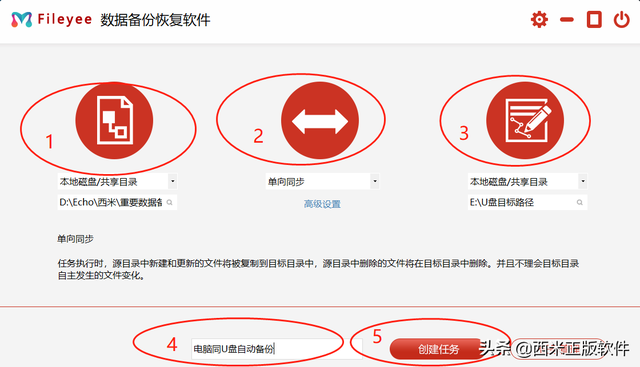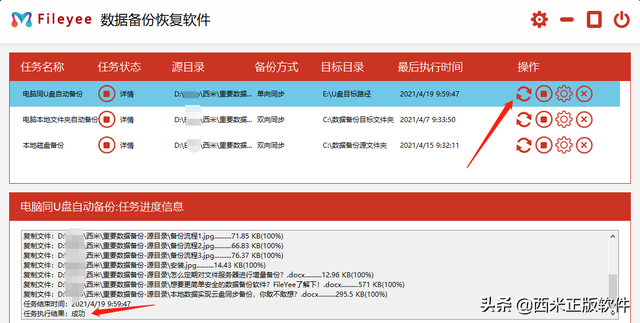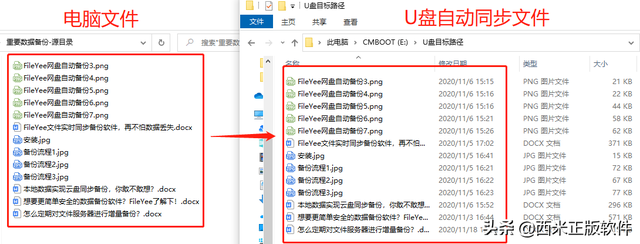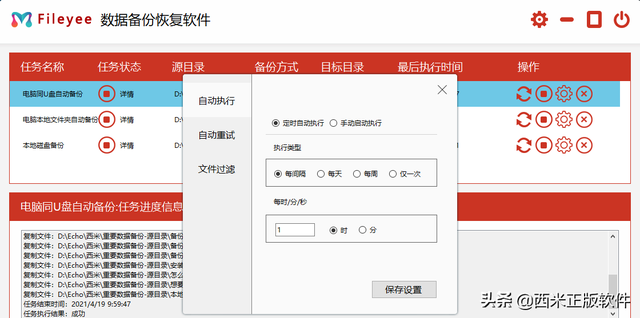Will automatically back up USB drive
php editor Apple introduces you a practical tool - software that can automatically back up a USB flash drive. This software was originally designed to solve the problem of data loss or damage when using USB flash drives. Through settings, users can easily realize automatic backup of U disk data and no longer worry about losing important files. This software is easy to operate and does not require complicated settings. Just insert a USB flash drive and it will automatically back up, making your data more secure and reliable. Both individual users and business users can benefit from it. For more detailed information about this software, please pay attention to the follow-up reports on the php Chinese website.

Preparation tools: FileYee
Basic equipment: computer, U disk
Basic work: Insert the U disk into the computer and display normally, download and install the FileYee software.
Step 1: Create a backup taskOpen FileYee and create a backup task:
①Select the local disk/shared directory, click the query button to select the backup source path, which is the folder that needs to be backed up on your computer ;
When choosing the synchronization backup method, one-way synchronization is generally selected, that is, changes in computer files will be automatically synchronized to the U disk, but changes in U disk files will not automatically update the computer files.
③Select the local disk/shared directory, click the query button to select the backup target path, which is your U disk, just select it directly;
When editing the backup task, if there is no change, the software will It automatically defaults to "My Backup Task 1", and the number increases gradually. But it is recommended that you give the task a name so that it can be easily found later, such as "Automatic backup of computer and USB flash drive."
⑤Click "Create Task".
 Step 2: Refresh to start the first backup
Step 2: Refresh to start the first backup After the task is created, return to the task management center and click "Refresh" to start the first automatic backup. Under the file backup, you can view the task progress information. After the backup is completed, "Task execution was successful." will be prompted, indicating that the backup process has been completed.

If the task fails to execute, it can be re-created, and usually it will be executed successfully. After the backup is successful, we can look at the comparison chart of the two folders:
 Step 3: Set the synchronization update frequency
Step 3: Set the synchronization update frequencyFinally set the synchronization update frequency, which is the frequency and number of updates you want, and the software will automatically The synchronized time can be accurate to seconds, so it can meet personalized needs. At the same time, you can also set "file filtering" and "automatic retry". If you don't know how to set it, you can refer to the article: Advanced settings management of FileYee data automatic backup software,

Automatic backup of entire computer files with U disk The process is completed in these three simple steps, so that automatic backup can be easily realized, saying goodbye to manual copying and pasting, which will greatly improve work efficiency. What needs to be noted here is: If the USB flash drive is pulled out of the computer, you may need to re-create the task to achieve automatic backup.
The above is the detailed content of Will automatically back up USB drive. For more information, please follow other related articles on the PHP Chinese website!

Hot AI Tools

Undresser.AI Undress
AI-powered app for creating realistic nude photos

AI Clothes Remover
Online AI tool for removing clothes from photos.

Undress AI Tool
Undress images for free

Clothoff.io
AI clothes remover

AI Hentai Generator
Generate AI Hentai for free.

Hot Article

Hot Tools

Notepad++7.3.1
Easy-to-use and free code editor

SublimeText3 Chinese version
Chinese version, very easy to use

Zend Studio 13.0.1
Powerful PHP integrated development environment

Dreamweaver CS6
Visual web development tools

SublimeText3 Mac version
God-level code editing software (SublimeText3)

Hot Topics
 1386
1386
 52
52
 How to use sql datetime
Apr 09, 2025 pm 06:09 PM
How to use sql datetime
Apr 09, 2025 pm 06:09 PM
The DATETIME data type is used to store high-precision date and time information, ranging from 0001-01-01 00:00:00 to 9999-12-31 23:59:59.99999999, and the syntax is DATETIME(precision), where precision specifies the accuracy after the decimal point (0-7), and the default is 3. It supports sorting, calculation, and time zone conversion functions, but needs to be aware of potential issues when converting precision, range and time zones.
 How to create oracle database How to create oracle database
Apr 11, 2025 pm 02:36 PM
How to create oracle database How to create oracle database
Apr 11, 2025 pm 02:36 PM
To create an Oracle database, the common method is to use the dbca graphical tool. The steps are as follows: 1. Use the dbca tool to set the dbName to specify the database name; 2. Set sysPassword and systemPassword to strong passwords; 3. Set characterSet and nationalCharacterSet to AL32UTF8; 4. Set memorySize and tablespaceSize to adjust according to actual needs; 5. Specify the logFile path. Advanced methods are created manually using SQL commands, but are more complex and prone to errors. Pay attention to password strength, character set selection, tablespace size and memory
 How to delete rows that meet certain criteria in SQL
Apr 09, 2025 pm 12:24 PM
How to delete rows that meet certain criteria in SQL
Apr 09, 2025 pm 12:24 PM
Use the DELETE statement to delete data from the database and specify the deletion criteria through the WHERE clause. Example syntax: DELETE FROM table_name WHERE condition; Note: Back up data before performing a DELETE operation, verify statements in the test environment, use the LIMIT clause to limit the number of deleted rows, carefully check the WHERE clause to avoid misdeletion, and use indexes to optimize the deletion efficiency of large tables.
 How to add columns in PostgreSQL?
Apr 09, 2025 pm 12:36 PM
How to add columns in PostgreSQL?
Apr 09, 2025 pm 12:36 PM
PostgreSQL The method to add columns is to use the ALTER TABLE command and consider the following details: Data type: Select the type that is suitable for the new column to store data, such as INT or VARCHAR. Default: Specify the default value of the new column through the DEFAULT keyword, avoiding the value of NULL. Constraints: Add NOT NULL, UNIQUE, or CHECK constraints as needed. Concurrent operations: Use transactions or other concurrency control mechanisms to handle lock conflicts when adding columns.
 What are the oracle11g database migration tools?
Apr 11, 2025 pm 03:36 PM
What are the oracle11g database migration tools?
Apr 11, 2025 pm 03:36 PM
How to choose Oracle 11g migration tool? Determine the migration target and determine the tool requirements. Mainstream tool classification: Oracle's own tools (expdp/impdp) third-party tools (GoldenGate, DataStage) cloud platform services (such as AWS, Azure) to select tools that are suitable for project size and complexity. FAQs and Debugging: Network Problems Permissions Data Consistency Issues Insufficient Space Optimization and Best Practices: Parallel Processing Data Compression Incremental Migration Test
 How to clean all data with redis
Apr 10, 2025 pm 05:06 PM
How to clean all data with redis
Apr 10, 2025 pm 05:06 PM
How to clean all Redis data: Redis 2.8 and later: The FLUSHALL command deletes all key-value pairs. Redis 2.6 and earlier: Use the DEL command to delete keys one by one or use the Redis client to delete methods. Alternative: Restart the Redis service (use with caution), or use the Redis client (such as flushall() or flushdb()).
 How to add multiple new columns in SQL
Apr 09, 2025 pm 02:42 PM
How to add multiple new columns in SQL
Apr 09, 2025 pm 02:42 PM
Methods to add multiple new columns in SQL include: Using the ALTER TABLE statement: ALTER TABLE table_name ADD column1 data_type, ADD column2 data_type, ...; Using the CREATE TABLE statement: CREATE TABLE new_table AS SELECT column1, column2, ..., columnn FROM existing_table UNION ALL SELECT NULL, NULL, ..., NUL
 How to delete all data from oracle
Apr 11, 2025 pm 08:36 PM
How to delete all data from oracle
Apr 11, 2025 pm 08:36 PM
Deleting all data in Oracle requires the following steps: 1. Establish a connection; 2. Disable foreign key constraints; 3. Delete table data; 4. Submit transactions; 5. Enable foreign key constraints (optional). Be sure to back up the database before execution to prevent data loss.




